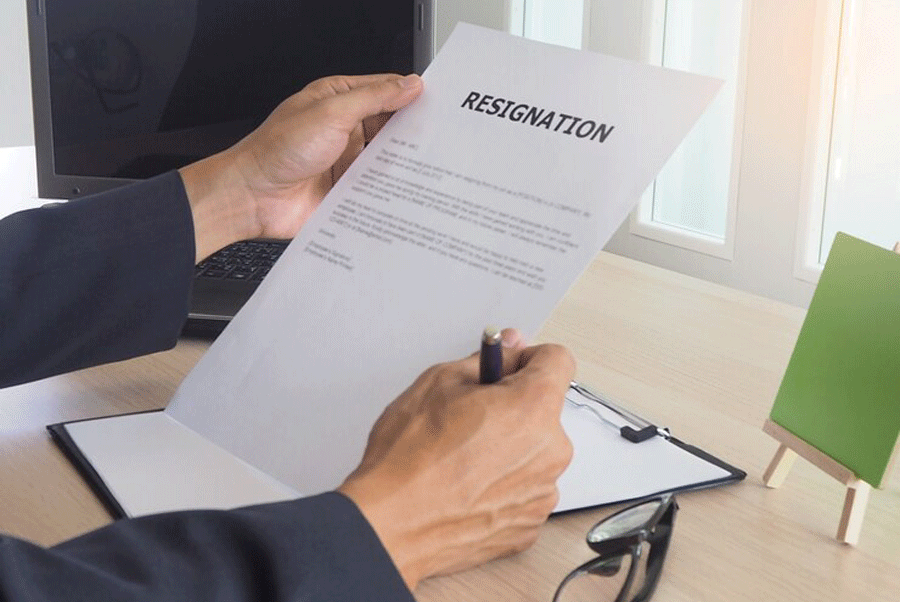Most employment contracts are explicit about what happens if an employee wants to leave their workplace for personal reasons. Organizations will typically allow employees to resign from their positions with a notice period and a specific date at which the resignation takes effect. The specific notice period to provide to the employer depends on the type of contract the organization has with the employee- but it typically varies from two weeks to one month. The length of this period may also depend on other factors, such as the nature of the job, the employee’s seniority, and any specific terms outlined in the employee handbook or employment contract.
When resigning from an organization, it is essential to conform to the formal timelines and procedures that the organization has laid out. It is also imperative to ensure that the employer knows of the intention to resign by providing them with a professionally written resignation letter. Generally, an effective letter of resignation will include the notice period that an employee wishes to adhere to and the specific departure date.
This article provides a complete guide to writing a considerate resignation letter due to relocation to ensure that the intent of the resignation is communicated to the employer in a manner that does not burn the employee’s professional bridges. It also includes some helpful tips to ensure that the resignation and transitioning process are smooth.
Free Templates
Given below are resignation letter templates:
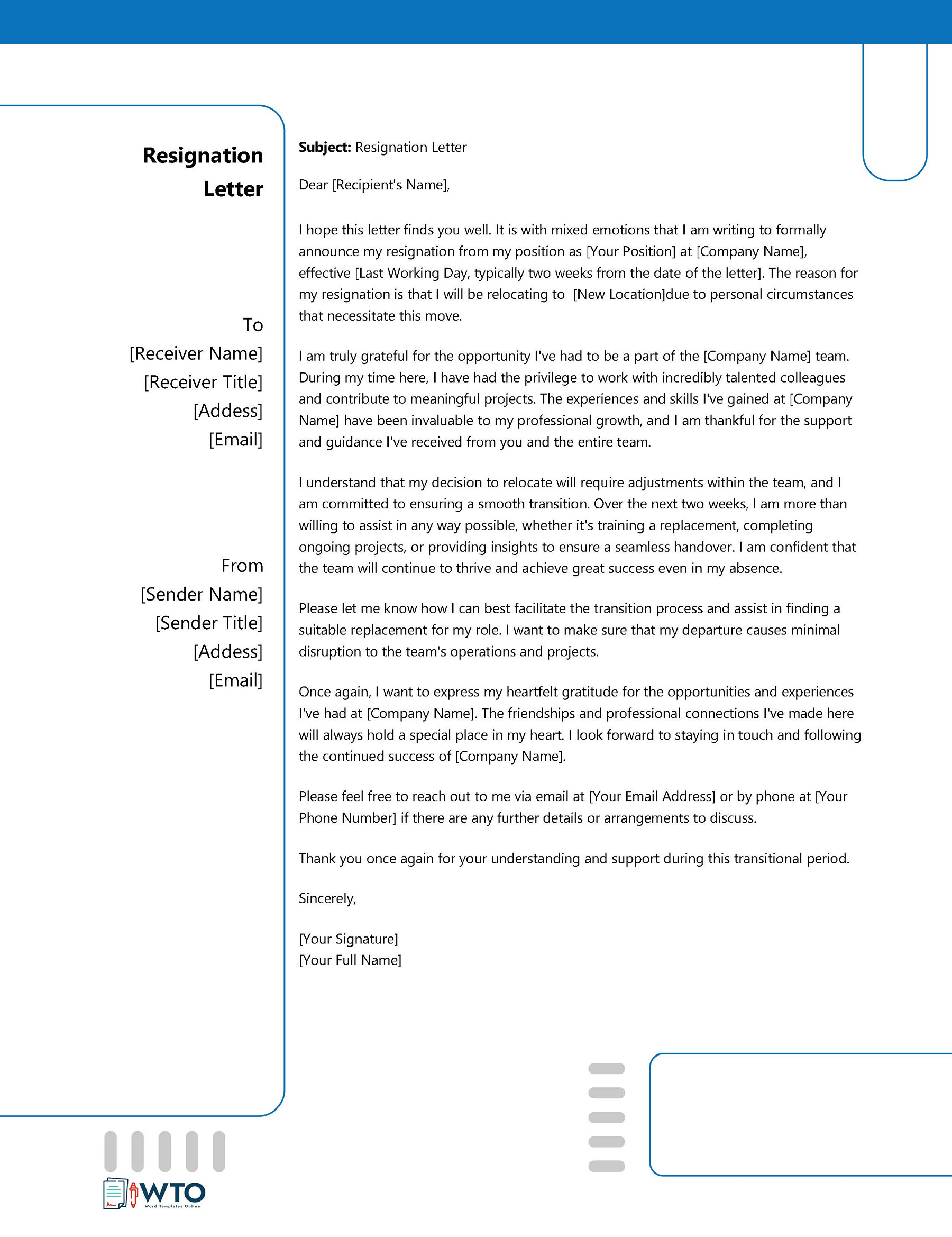
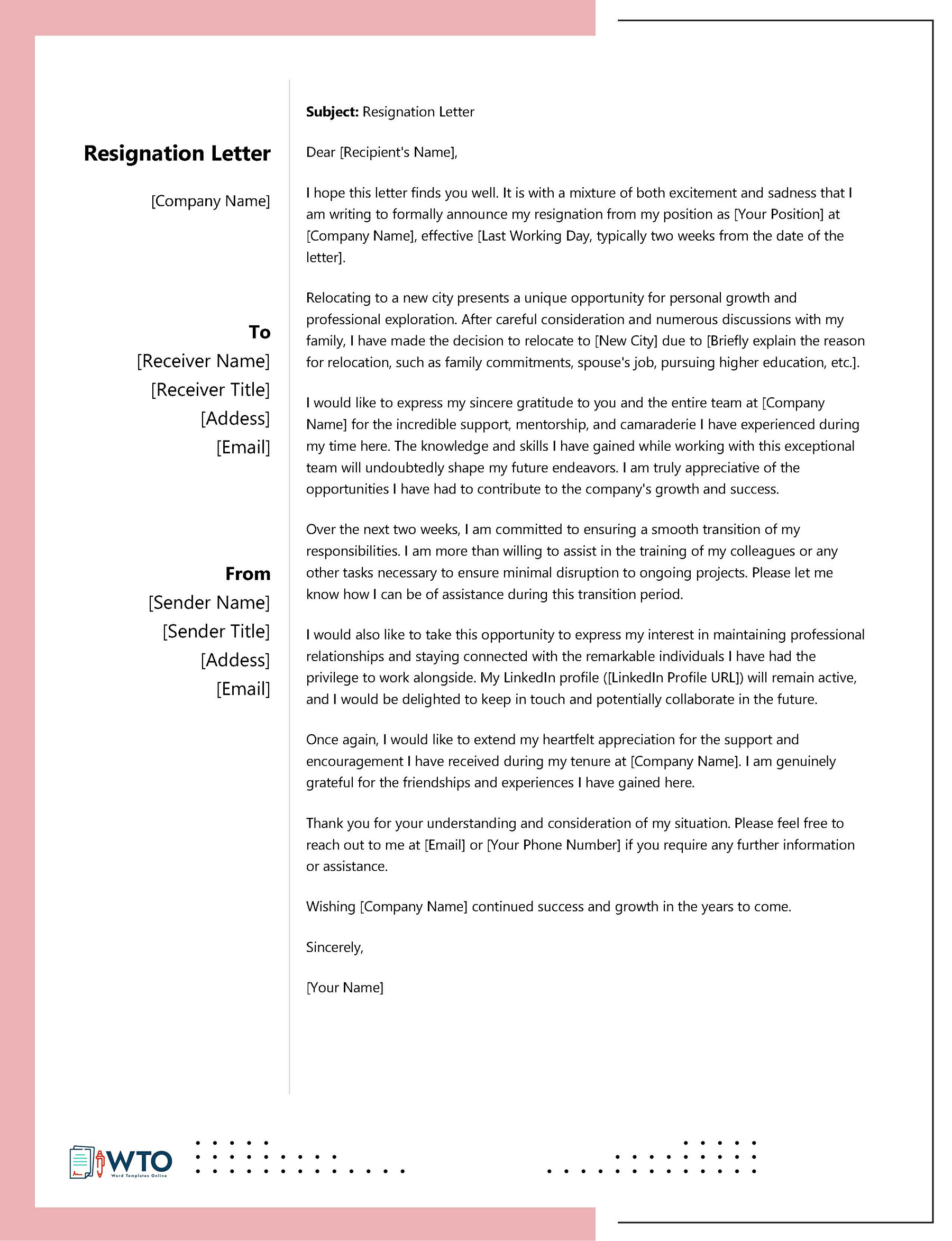
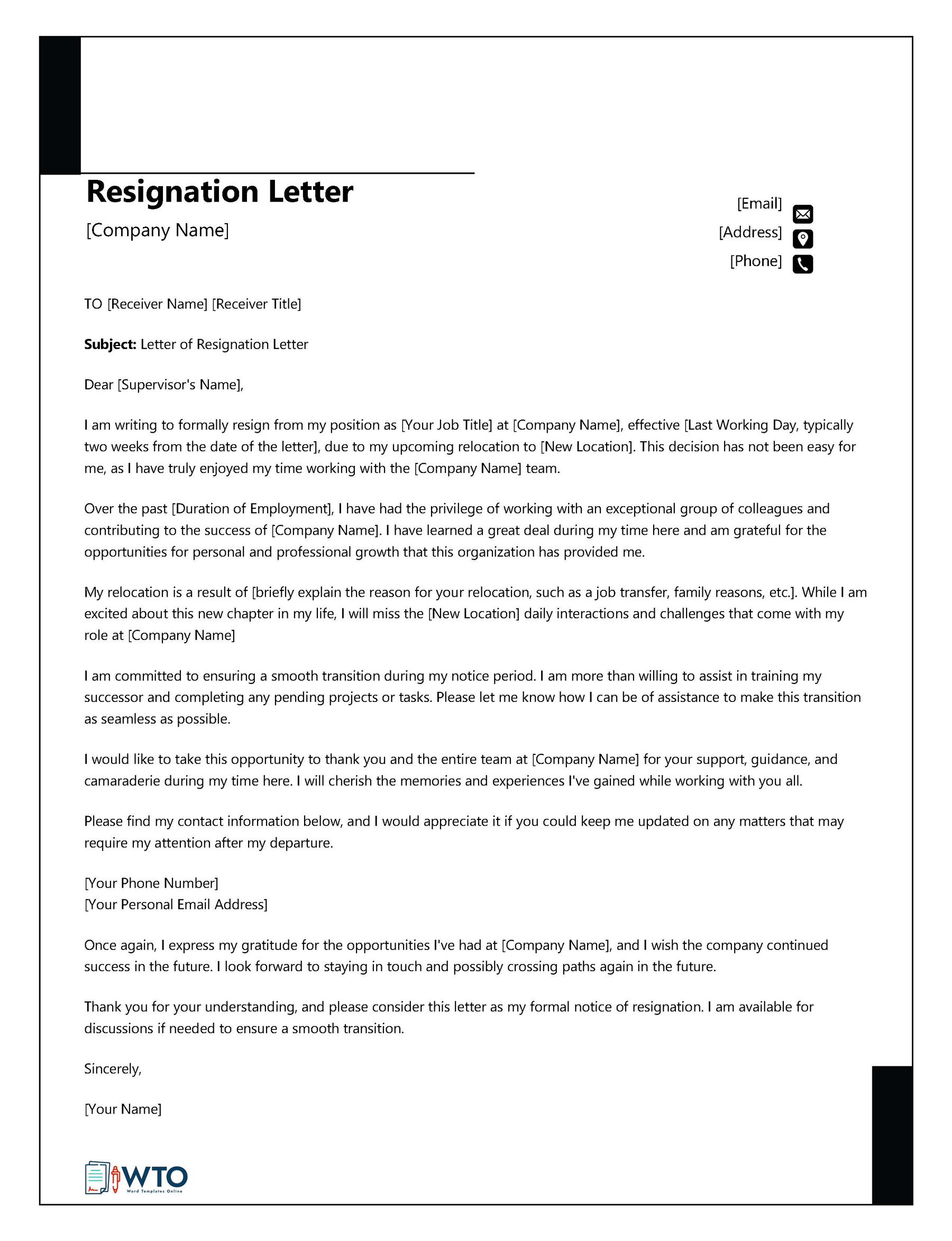
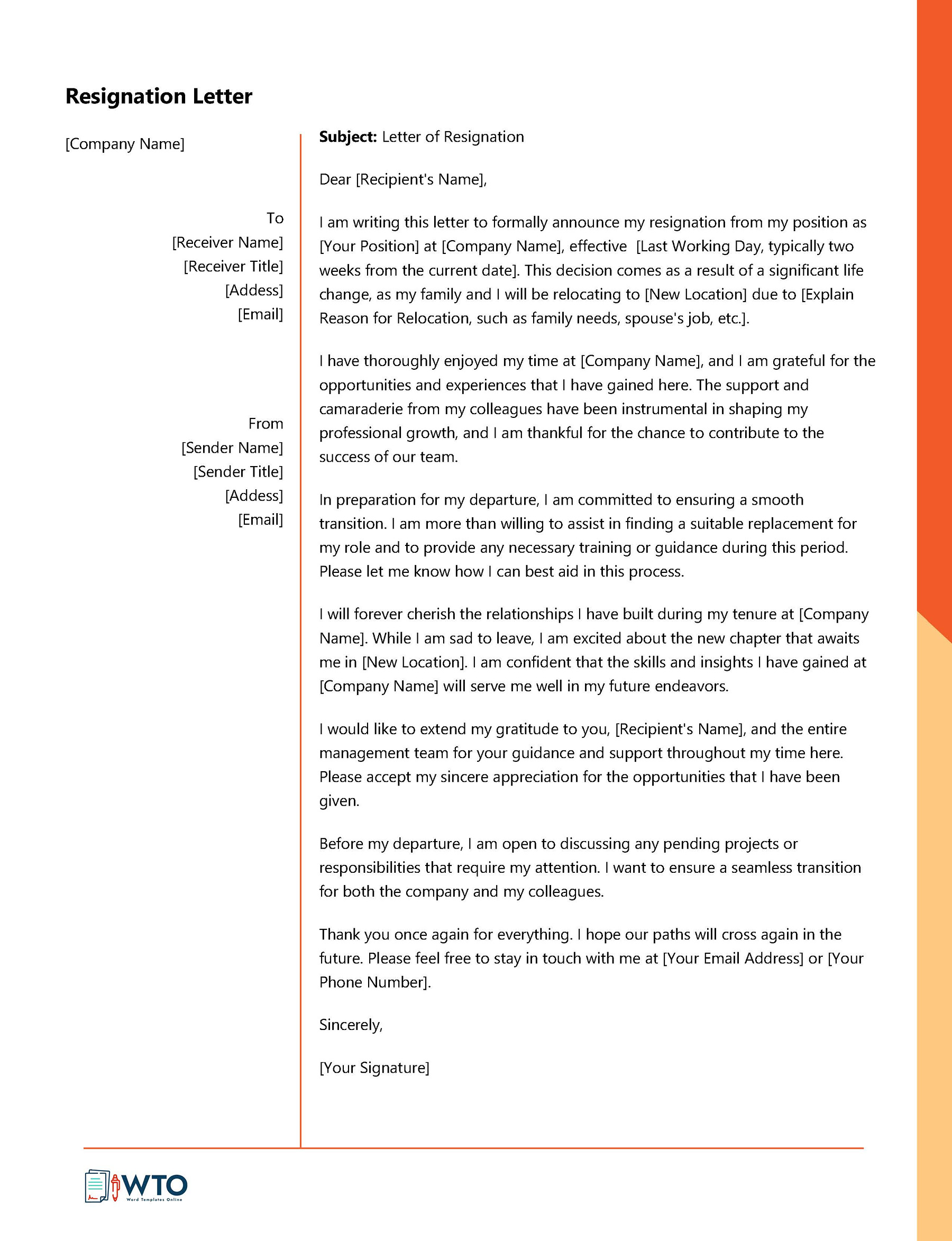
What is a Relocation Resignation Letter?
A relocation resignation letter is a formal business correspondence that an employee sends to the employer to officially notify them about their intention to resign from the organization due to relocation.
Several reasons may prompt an employee to relocate. Common reasons for relocation include the desire to move closer to family and friends, to pursue a romantic interest, the need to pursue a new career path or professional growth opportunity, to look for greener pastures or a lower cost of living, the desire to have a change of scenery, etc.
Regardless of the circumstances, as a reputable employee, you should never forget that you are resigning from a professional relationship, not a personal one. As such, it is vital to keep the contents of your letter strictly professional and avoid venting or airing any grievances that may exist between you and the employer. Respecting your contractual obligations to the employer and writing a letter that communicates your departure date, provides a reason(s) for leaving, and outlines steps you will take to make the transitioning process smoother for everyone involved will help ensure that you leave your current employer with grace and dignity.
Why is it Important to Send a Relocation Letter?
Generally, sending a formal resignation notice to the employer whenever you intend to terminate your employment contract is considered a professional courtesy. This is important as the letter formally communicates your intentions, demonstrating your respect for the employer and the organization.
In addition, sending the relocation resignation letter ahead of time allows the employer to find a replacement sooner. The letter also helps ensure that your leaving date is not pushed back and that your resignation is accepted. This is mainly because it gives the employer sufficient time to find and train a replacement and smooth out any issues that may arise with your job description, duties, tasks, etc.
note
It is also important for an organization to know about any impending change in its workforce reasonably in advance to appropriately plan for the eventuality. This is so that there are no major delays in operations or project completion due to your sudden absence.
An unanticipated departure can also cause various problems, such as a sudden increase in workload that may have to be shouldered by other employees, which may negatively impact their performance and the organization’s overall reputation.
Consequently, your relationship with the employer will be tainted; hence, they will be less likely to provide you with positive references for your future job search endeavors. Moreover, failing to maintain a positive relationship with the employer diminishes your chances of being re-hired in the organization. This will negatively impact your professional network and development opportunities.
Lastly, having documented proof of your reason for resigning in the personnel file and the timeline you provided for your departure may be beneficial if there is any need to contest any negative feedback about you. It may also help you counter the possibility of being wrongfully terminated as retaliation for leaving the company. Finally, it will give a good explanation to any prospective employers interested in verifying your previous work history and employment records.
How to Write a Resignation Letter Due to Relocation
When writing a resignation letter due to relocation, it is imperative to ensure that you are clear and concise in conveying your message to the employer. You can achieve this by keeping the tone professional and factual and refraining from expressing frustrations or hatred towards the employer.
Your resignation letter must include the following essential elements:
A professional business letter must contain appropriate letterhead, and the relocation resignation letter is no exception. The header should include your name, mailing address, and contact information in the topmost left section of the page. The date of writing should appear below your personal contact information to serve as a reliable reference for when you notified the employer of your intention to leave your current position. The recipient’s personal information, including their name and designation, should appear beneath the date, then include the company name, email, and mailing address.
Introduction
After writing your relocation resignation letter’s header, proceed to begin the letter using a professional and personalized salutation. Start the letter with “Dear Mr./Ms./Mrs. employer’s first/last name” or “Dear Company name” if you are unsure of the respective person handling resignation notices within the organization.
State your objective
The next step involves communicating your purpose for writing the letter precisely and concisely. The letter’s objective should be mentioned in the introductory paragraph to ensure that the employer promptly recognizes the reason for writing. Then, in a few brief lines, state that you are writing the letter to officially resign from the organization and include the job position or title.
Mention the intended resignation date
Once you have stated your purpose for writing the letter, provide the date by which you will officially stop working for the organization. Ideally, your last day of employment with the employer should be before your intended relocation date. In addition, the effective resignation date should allow the employer ample time to find a replacement or prepare for your exit. Most employers require their employees to issue them at least two weeks’ notice or more, based on the nature and complexity of the job.
However, before deciding on the exact date to provide as your resignation effective date, consider checking the employee handbook to determine if there are any special considerations or timelines you need to adhere to, ensuring that you maintain a positive relationship with the employer.
Explain your reason for leaving the organization
The next step in writing an effective resignation letter is to briefly explain why you are resigning from the position. In a few short lines, inform the employer that you will be moving to a new residential area and will therefore be unable to continue in your current position.
note
However, note that you do not have to specify any reason for leaving the company in your resignation letter.
Offer your assistance to ease the transition
After explaining your reason for leaving the organization, it is important to offer your assistance to the employer to ease their transition process. Clearly state what you can and are willing to do to assist them with the transition process.
EXAMPLE
You can state that you are willing to help the employer prepare for your departure by offering to train your replacement.
You can also mention that you will help them with the new employee’s on boarding process to ensure that the company continues to perform at the same level of efficiency and quality. Offering to help with the transition is optional, but it is an honorable and gracious gesture demonstrating to the employer that you care about the organization and its continued well-being.
Reflect on your time in the company and express gratitude
It is essential to close your resignation letter with a reflection of your time in the organization and to thank the employer for providing you with an opportunity to work with them. Briefly mention what you have personally gained from the experience and express a gracious thank you for the honor of working with them as well as the opportunities that the employer accorded you during your employment tenure.
End with an appropriate sign-off
The last essential element of a standard resignation letter is the sign-off. A good rule of thumb is to end your relocation resignation letter with a formal closing such as “sincerely,” “yours truly,” “regards,” or “warmly,” etc., then sign your name beneath the closing remarks.
TEMPLATE
[Your Full Name]
[Your Current Address]
[City, State, Zip Code]
[Your Email Address]
[Your Phone Number]
[Date]
[Supervisor’s Full Name]
[Their Job Title]
[Company Name]
[Company Address]
[City, State, Zip Code]
Dear [Supervisor’s Name],
Subject: Resignation Notice – [Your Full Name]
I am writing to formally announce my resignation from my position as [Your Position] at [Company Name], effective [Last Working Day, typically two weeks from the date of the letter]. This decision comes after careful consideration and is due to my upcoming relocation to [New City/State or Country], which is a necessary move for [briefly mention the reason, such as family reasons, spouse’s job, etc.].
Working at [Company Name] has been a highly rewarding experience, and I am grateful for the opportunities for professional and personal development that I have encountered during my tenure. I have thoroughly enjoyed being part of the [Your Department/Team] and am particularly proud of [mention any significant achievements or projects].
I am committed to ensuring a smooth transition and will do everything possible to assist in handing over my responsibilities. Over the next [notice period duration], I am available to train my replacement, complete outstanding projects, and provide any assistance that will help minimize the impact of my departure.
I would like to express my deepest gratitude to you and the team for your support and guidance. I have greatly valued the working relationships I’ve built here and hope to stay in touch in the future.
Thank you again for the opportunity to be a part of [Company Name]. I wish the company continued success and hope our paths may cross again.
Sincerely,
[Your Signature (if sending a hard copy)]
[Your Printed Name]
Sample Relocation Resignation Letter
Dear Mr. Green,
Subject: Resignation from the Position of Marketing Coordinator
I am writing to formally resign from my position as Marketing Coordinator at ABC Corporation, effective February 14, 20XX. This decision has been made due to my upcoming relocation to New York City, a move necessitated by personal family commitments.
My time at ABC Corporation has been both professionally rewarding and personally enriching. I am particularly proud of our team’s achievements in the recent product launch, which was a significant success and a highlight of my career. The skills and experiences I have gained here are invaluable, and I am deeply grateful for the opportunities and support provided to me.
I am committed to ensuring a smooth transition over the next two weeks. I will complete all current projects to the best of my ability and assist in the training of my replacement or in transferring my responsibilities to other team members as required.
I would like to express my sincere gratitude for the mentorship and guidance I have received during my tenure. Working with you and the team has been a pleasure, and I will genuinely miss the collaborative environment and camaraderie at ABC Corporation.
Thank you once again for the opportunity to be a part of this organization. I hope to keep in touch and look forward to any potential collaborations in the future.
Sincerely,
Jane Carter
Resignation Letter Writing Tips
To ensure that your resignation letter demonstrates tact and positively contributes to your professional relationship with the employer, there are a few helpful tips that you should keep in mind.
They include:
Use professional language
Your letter should be professional and courteous without sounding too formal or sarcastic. Remember that you will most likely keep professional contact with your former coworkers and bosses throughout your career, so it is important to remain respectful and cordial in your resignation letter. Besides, once you submit the letter to the HR department, it becomes a part of the company’s official record. Therefore, you need to ensure that your resignation letter reflects your professionalism.
Use proper spacing
Use proper spacing, margins, and font style to enhance the readability and presentation of your letter. Avoid using overly large line and paragraph spacing, odd-colored and decorative fonts, or other distracting formats. Instead, you should insert a single space between your header, body paragraphs, and conclusion to give your letter a neat and professional look.
Re-read your letter
Before you submit your resignation letter to the HR department, it is essential to re-read it and ensure that it is error-free and detailed. Proofreading your letter is essential, as a single error can affect the overall presentation and professionalism of your letter. It is also important to carefully proofread it to check on your language’s flow and clarity or identify any spelling, punctuation, and grammatical errors. You can also request a friend or family member to re-read it and then rectify any mistakes identified.
Print several copies of the final relocation resignation letter, and issue one copy to your supervisor and one to HR. Keep one for yourself. It is recommended that you store this hard copy in a folder so that you can have it handy when you need to reference some details regarding your resignation or the job itself. Moreover, having a copy for your personal records is vital, as it allows you to reference your professional experience as your career advances.
Wrapping Up
A quality and effectively written resignation letter due to any personal reasons, such as moving to a new residential area or state, helps to ensure that there are no negative/hard feelings between you and your employer. In the letter, communicate your intention to leave your current position and mention the effective date. It is also a good idea to briefly provide a reason for leaving the organization without disclosing too many details that can negatively impact your relationship with the employer.
Remember, the purpose of writing this letter is to primarily maintain a working relationship with your professional networks for future career opportunities and referrals. It is also a good idea to offer the employer some help to ensure the transition process is smooth and to always provide enough notice to enable them to prepare for the change. Finally, always use a professional tone, follow the standard business letter formatting guidelines, proofread and edit your letter before submitting it, and keep an extra copy for your records.








